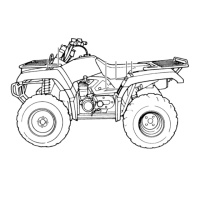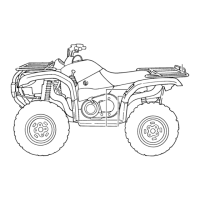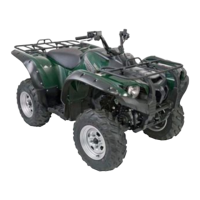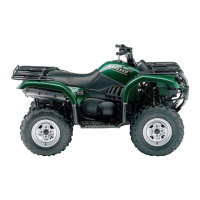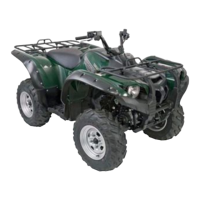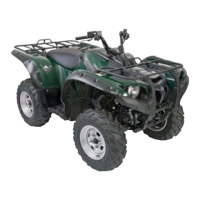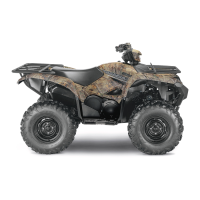
Do you have a question about the Yamaha Grizzly YFM600FWAM and is the answer not in the manual?
| Brand | Yamaha |
|---|---|
| Model | Grizzly YFM600FWAM |
| Category | Offroad Vehicle |
| Language | English |
Key safety points for ATV operation before starting.
Explains the meaning and importance of the Safety Alert Symbol for user safety.
Details the meaning of WARNING and CAUTION labels indicating risks and precautions.
Explains the purpose of NOTE labels for procedure clarity.
Specifies that the machine is designed for off-road use only.
Diagram showing label locations on the ATV.
Explains the load limit label and its significance for safe operation.
Warnings regarding age restrictions and prohibition of passengers.
Label describing the function of the drive select lever.
Warnings concerning improper use and operation of the ATV.
Further details on the age limit warning for ATV operation.
Guide on operating the drive select lever for different gear selections.
Overview of ATV hazards and importance of operator training for safety.
Guidelines for safe ATV operation, including hand position and speed.
Advice on riding in various terrains and conditions like hills and water.
Procedures for safe hill climbing and descending.
Guidance on avoiding obstacles in off-road riding.
Techniques for controlling skidding and sliding on slippery surfaces.
Safety measures for riding through water.
Safety tips for operating the ATV in reverse.
Importance of correct tires and adhering to load limits.
Potential hazards of improper gasoline handling and avoidance.
Warning about exhaust fumes in closed areas.
Diagrams identifying major ATV components.
Location and importance of the key identification number.
How and where to find the Vehicle Identification Number.
Location and purpose of the model label.
Explains the function of the main switch for starting and stopping the engine.
Identifies and explains the functions of various indicator lights on the dashboard.
Details on the oil temperature indicator light and its caution.
Explains the function of neutral and reverse indicator lights.
Flowchart for checking the oil temperature indicator light.
Functionality of the speedometer, odometer, and trip odometer.
Explains the four-wheel drive indicator light operation.
How to read the fuel gauge and understand reserve fuel.
Identifies lights, engine stop, and start switches on the handlebar.
Operation of the start switch for engine ignition.
How to operate the lights switch for low and high beams.
Function of the engine stop switch for ignition control.
How to operate the 2WD/4WD selection switch.
How to use the throttle lever to regulate engine speed.
Function of the speed limiter and throttle free play adjustment.
Location and operation of the front brake lever.
Location and operation of the rear brake pedal and lever.
How to apply and release the parking brake.
Explanation of shifting gears using the drive select lever.
How to use the recoil starter for manual engine starting.
Instructions for removing and installing the fuel tank cap.
Operation of the fuel cock lever (OFF, ON, RES).
How to use the starter (choke) for cold engine starts.
Procedure for removing and reinstalling the seat.
Maximum load limit for the storage box and cautions.
Maximum load limit for the front carrier.
Maximum load limit for the rear carrier.
How to adjust the rear shock absorber spring preload.
Information on the auxiliary DC connector and its usage chart.
Instructions for connecting accessory leads to the power plug.
Steps for connecting accessory plugs and ensuring correct polarity.
Step-by-step guide on how to use the auxiliary DC connector.
Summary table of items to check before operation and corresponding pages.
Emphasizes pre-operation checks for safety and machine care.
Detailed checks for front/rear brakes, fluid level, and operation.
Warning about operating with improperly serviced or adjusted brakes.
Ensures sufficient gasoline in the tank and specifies recommended fuel.
Warning and advice on safe refueling to prevent fires.
How to check engine oil level and recommended oil types.
Checking oil levels for final and differential gears.
Verifying correct operation and spring-back of the throttle lever.
Checking tires for wear, damage, and correct pressure.
Maximum pressure for seating tire beads and safety warning.
How to measure tire pressure using a gauge and specifications.
How to determine when tires need replacement based on wear.
Step-by-step instructions for starting a cold engine, including warnings.
Explains choke lever positions for different ambient temperatures.
Steps for starting the engine using the starter switch.
Procedure for starting a warm engine.
Guidance on warming up the engine for optimal performance.
Detailed instructions for shifting gears with the drive select lever.
Procedure for shifting from neutral to reverse and safety notes.
How to use the reverse lock release wire in challenging situations.
Guidelines for the engine break-in period (0-20 hours).
Instructions for parking the ATV safely on level ground.
Specific procedures for parking the ATV on slopes safely.
Considerations for using accessories and loading cargo on the ATV.
Specifies maximum load limits for vehicle, carriers, and trailer.
Warning about the dangers of overloading the ATV or trailer.
Overview of ATV riding for recreation and utility, emphasizing skills.
Importance of familiarizing oneself with ATV controls and operation.
Advice for safe riding and skill development.
Warning about operating without proper instruction and associated risks.
Warning regarding operating the ATV under 16 years of age.
Warning that the ATV is designed for operator only; passengers are prohibited.
Importance of wearing approved helmet, eye protection, and protective clothing.
Warning against operating the ATV under the influence of alcohol or drugs.
Reminder to perform pre-operation checks for safety and machine care.
Warning about operating with improper tires or uneven tire pressure.
Warning against operating the ATV too fast for skills or conditions.
Explanation of the speed limiter and its effect on speed.
Caution about how loads and accessories affect handling and control.
Importance of keeping feet on footboards during operation.
Warning against attempting stunts like wheelies or jumps.
Warning against improper modifications and use of non-genuine parts.
Warning about the hot exhaust system and avoiding contact.
Warning that the ATV is for off-road use only; paved surfaces cause loss of control.
Warning against riding on public roads due to collision risk with vehicles.
Caution for riding in unfamiliar areas with potential hazards.
Warning about operating on excessively rough, slippery, or loose terrain.
Recommendation to use a caution flag in low visibility areas.
Warning against riding on private property without permission.
Advice on practicing ATV operation in a safe area.
Procedures for starting the engine and warming it up.
Techniques for proper turning to achieve maximum traction.
How to practice turning techniques at low speeds for safe maneuvering.
Proper techniques for climbing hills safely and maintaining control.
Warning about operating on excessively steep hills and potential overturns.
Warning against improperly crossing hills or turning on hills.
Procedures for safely traversing slopes and maintaining balance.
What to do if the ATV stalls or stops while climbing a hill.
How to handle the ATV rolling backwards while on a hill.
Specific instructions for 2WD and 4WD when rolling backwards.
Techniques for riding downhill, including weight positioning and braking.
Warning about improper downhill riding and loss of control.
Procedures for crossing slopes and avoiding slippery surfaces.
How to cross shallow water safely and check brakes afterwards.
Importance of checking brakes after riding through water.
Advice for riding over rough terrain, including obstacle avoidance.
Understanding and controlling sliding and skidding on surfaces.
Techniques for controlling skidding and regaining traction.
Guidance on common riding problems like turning and hill climbing.
What to do if the ATV stalls or rolls backward in water.
Importance of periodic inspection, adjustment, and lubrication for ATV longevity.
Recommendation to keep the owner's manual and tool kit accessible.
A chart detailing periodic maintenance and lubrication intervals.
Detailed schedule for initial maintenance tasks.
Further details on periodic maintenance tasks and service intervals.
Procedure for checking the engine oil level and recommended oil.
Steps for replacing engine oil and the oil filter, including torque specs.
Detailed steps for oil filter replacement, including torque specifications.
Specifies oil quantity for changes and filter replacement, with cautions.
Procedure for checking final gear oil level and recommended oil.
Steps for replacing final gear oil, including torque specs.
Procedure for checking differential gear oil level and recommended oil.
Steps for replacing differential gear oil, including torque specs.
How to inspect front axle boots for damage.
How to inspect the spark plug and its gap, including specifications.
Instructions for cleaning the air filter element and case.
Detailed steps for cleaning the air filter element, including warnings.
Notes on air filter cleaning frequency and proper installation.
Procedure for cleaning the spark arrester.
Information on carburetor adjustment, recommending professional service.
How to adjust the engine idle speed.
Notes on valve clearance adjustment, recommending professional service.
Procedure for adjusting the throttle lever free play.
How to inspect front brake pads for wear.
How to inspect rear brake shoes using the wear indicator.
How to check brake fluid level and recommended fluid.
Guidelines for brake fluid replacement, recommending professional service.
Procedure for adjusting the front brake lever free play.
Warning about operating with improperly serviced or adjusted brakes.
How to adjust the rear brake pedal free play.
Details on adjusting brake cables for proper lever and pedal free play.
Importance of inspecting and lubricating control cables.
Instructions for lubricating brake lever and pedal pivot points.
Procedure for removing the ATV wheels.
Procedure for installing ATV wheels, noting the arrow mark direction.
Details on the sealed battery type and cautions.
Recommendations for battery maintenance when the ATV is not in use.
How to replace fuses and specifications for main and auxiliary fuses.
Information on headlight beam adjustment or bulb replacement.
General advice on troubleshooting engine problems and seeking dealer service.
Flowchart to diagnose common starting and running issues.
Detailed steps for cleaning the ATV, including blocking exhaust and using mild detergents.
Instructions for washing and drying the ATV, including cautions.
Steps for preparing the ATV for long-term storage, including fuel and battery.
Advice on storage location and conditions to prevent deterioration.
Specifications for dimensions, weights, and basic weight.
Details on engine type, displacement, bore, stroke, and compression.
Recommended engine oil types, classifications, and quantities.
Specifications for final gear oil, differential gear oil, and air filter.
Specifications for spark plug, transmission, and clutch type.
Specifications for frame type, caster angle, trail, and brakes.
Specifications for suspension type and wheel travel.
Specifications for ignition, generator, battery, and headlight types.
Details on bulb voltage, wattage, and quantity for various lights.
Federal law prohibiting tampering with noise control systems and related components.
A table for recording maintenance intervals, dates, mileage, and dealer information.
Details of the limited warranty coverage for Yamaha ATVs.
Lists general exclusions from warranty coverage.
FAQ addressing common questions about warranty coverage and terms.
Contact information and advice for customer service and warranty inquiries.
Explains the benefits and coverage of the Yamaha Extended Service plan.
Encourages purchasing Extended Service for investment protection.

